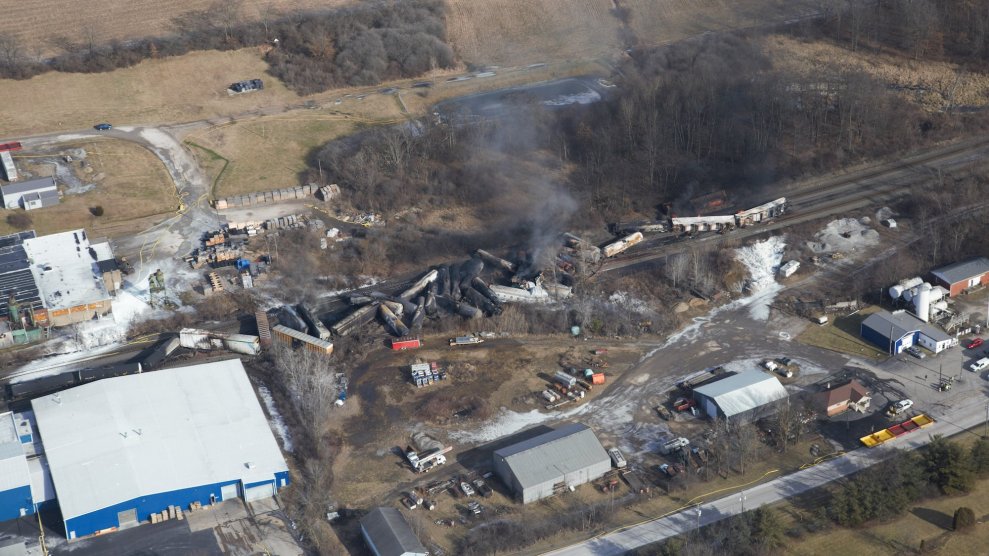
Aerial views of Cape Fear River in North Carolina, which is surrounded by forests. Ken Blevins/Star News/AP
This story was originally published by Inside Climate News and is reproduced here as part of the Climate Desk collaboration.
In advance of a United Nations meeting this week where pollution is on the agenda, a UN human rights team has called out a PFAS manufacturing plant in North Carolina as a poster child for irresponsible behavior.
Nine independent UN human rights advisors put blame for widespread contamination in the area from a Chemours plant near Fayetteville, a Dupont spinoff, and said “even as DuPont and Chemours had information about the toxic impacts of PFAS on human health and drinking water, the companies continued to produce and discharge PFAS.”
The experts also rebuked state and federal regulators, alleging lax enforcement and arguing that regulatory bodies, including the Environmental Protection Agency, had been “captured” by the plant’s current and past owners, a term implying the regulators were inappropriately doing the companies’ bidding.
At issue are the PFAS chemicals made at the Fayetteville plant, or per-and polyfluoroalkyl substances. They are known as “forever chemicals” because they last a very long time in the environment. Various PFAS are used to make certain kinds of plastics, and are found in a wide array of consumer products, such as shampoo, dental floss, nail polish, eye makeup, fast food containers and stain-resistant coatings on fabrics.
Created in the 1940s, PFAS are now found in the blood of humans and animals all over the world.
“DuPont and Chemours have produced, marketed and profited from PFAS for decades, contributing to a global toxic contamination problem,” the UN panel said in a public statement released Wednesday. “DuPont and Chemours appear to have impermissibly captured the US Environmental Protection Agency and delayed (their) efforts to properly regulate PFAS chemicals.”
For their part, the companies pushed back hard.
Chemours said in a written statement that products it makes in North Carolina are contributing to “vital technologies for green hydrogen, electric vehicles and semiconductor manufacturing. We are committed to responsibly manufacturing and producing products in a manner consistent with international principles, including the UN Guiding Principles on Business and Human Rights,” a set of standards adopted in 2011 that seek to prevent and address human rights abuses committed in business operations.
In its response, DuPont de Nemours, Inc., shared a letter with Inside Climate News that it wrote late last year to the UN Human Rights Commission in response to the inquiry. That letter detailed a complicated history of Dupont corporate reorganizations, and denied responsibility for the Fayetteville plant.
“To implicate DuPont de Nemours in these issues disregards these varied corporate histories, the movement of product lines and personnel that now exist with entirely different companies,” the company wrote.
In a press release, four UN experts on human rights and the environment and five members of the UN Working Group on Business and Human Rights, following an investigation into the Chemours plant last year, called on the UN Environment Assembly meeting next week in Nairobi to “address the serious risks and harms posed by PFAS for communities around the world.”
The 10-year-old Environment Assembly will meet from Feb. 26 to March 1. Its resolutions are not legally binding but can be important steps toward global environmental accords and national policymaking. The meeting will be attended by heads of state and more than 5,000 representatives from government, civil society and the private sector, according to the UN.
Emily Donovan, the co-founder of Clean Cape Fear, the North Carolina citizens group that last year petitioned for the human rights investigation, welcomed the UN team’s findings and said she hoped the matter would be discussed at the Nairobi meeting.
“It feels like validation,” Donovan said in an interview. “For a while, we felt like we were going to be ignored. Having the United Nations elevate PFAS, using North Carolina’s story as an example, amplifies a global concern that we really need to talk about.”
The UN advisors responded this week to Chemours and DuPont, saying in a press release that “this corporate restructuring has posed further obstacles to achieving accountability and effective remedies. Corporate restructuring should not lead to impunity for human rights abuses.”
Last June, Chemours, DuPont and another DuPont spinoff, Corteva, Inc., announced they had reached an agreement in principle to “comprehensively resolve all PFAS-related drinking water claims” in a class action lawsuit involving public water systems that serve the vast majority of the US population. “The companies will collectively establish and contribute a total of $1.185 billion to a settlement fund,” they announced, while denying the allegations.
The UN human rights investigation began following the petition by Clean Cape Fear, with help from the University of California, Berkeley School of Law.
In its request for help, Clean Cape Fear described what it called “an environmental human rights crisis in North Carolina involving pervasive human exposure to toxic chemicals. There, in the lower reaches of the Cape Fear River watershed, more than 500,000 residents have been chronically exposed to dangerous quantities of PFAS” from the Fayetteville plant.
The community action group demanded, among other remedies, company accountability for water treatment and clean-up costs for all impacted residents, and said it was worried about Chemours’ plans to expand PFAS production at its Fayetteville Works plant, and to ship PFAS waste from the Netherlands to the Chemours plant.
Last fall, UN human rights investigators released to the public several letters of allegation, including those sent to Chemours and Dupont. In the letter to Chemours, the investigators expressed “our most serious concern regarding the human rights and environmental impacts of Dupont and Chemours’ activities in the Fayetteville Works, particularly the discharge of toxic PFAS into the local environment. We are especially concerned about Dupont and Chemours’ apparent disregard for the wellbeing of community members, who have been denied access to clean and safe water for decades.”
That investigation has continued, said Marcos Orellana, one of the UN advisors whose title is special rapporteur on toxics and human rights, in a written statement.
This week, the UN advisors expressed “grave concern” about Chemours’ pending air permit before North Carolina regulators for the PFAS production expansion, and described the movement of PFAS waste from the Netherlands to North Carolina an “apparent breach of international law.”
Chemours said the recycling “is environmentally beneficial and has been repeatedly consented to by the applicable regulatory agencies.”
Donovan said the waste shipments “were going on for years, until they were stopped in 2018,” after they became public. Recently the shipments resumed, she said, with approval by the EPA. But EPA has since reversed course and stopped them.
For its part, the EPA said in a written statement—without elaborating—that the agency has since withdrawn its permission for the shipments because Chemours had provided inaccurate information.
“EPA is committed to protecting public health and the environment from PFAS pollution,” the EPA said. “Chemours … has a history of PFAS releases, which raises concerns about the company’s ability to take measures that fully protect public health and the environment. EPA will continue to work in close partnership with the North Carolina Department of Environmental Quality, as well as maintain a constructive dialogue with the company, to use every available tool to protect people from dangerous PFAS chemicals.”
The North Carolina Department of Environmental Quality described itself as “a leader” in addressing PFAS, citing enforcement actions since 2017 that have required Chemours to reduce its releases of the chemicals into the air and water, and onto the land.
Sharon Martin, deputy secretary for public affairs for the agency, cited a 2019 consent order and a 2020 addendum with the company, and other directives for Chemours, to reduce PFAS emissions and discharges, including having the company sample for contamination in more than 10,000 private drinking water wells in eight counties.
“DEQ will continue to hold Chemours accountable for the cleanup of PFAS contamination and for preventing future PFAS impacts to North Carolinians,” she said.
Responding to Chemours’ statements that PFAS is vital to a clean-energy transformation, the UN advisors declared that decarbonization strategies to address climate change must be integrated with detoxification strategies and guided by human rights.
It wasn’t clear this week the extent to which PFAS would be discussed at the forthcoming meeting of the UN Environment Assembly, the world’s top decision-making body on matters related to the environment.
The Stockholm Convention on Persistent Organic Pollutants, a 2001 treaty to protect human health and the environment from chemicals that remain intact in the environment for long periods, has taken action to control certain types of PFAS. But there is no comprehensive action yet at the global level addressing the threat of this class of hazardous chemicals, said Orellana, in a written statement.
The US signed the Stockholm Convention in 2001 but never ratified it.
The United Nations Environment Assembly “should take a strong commitment to prevent exposure from hazardous chemicals such as PFAS, highly hazardous pesticides, endocrine disrupting chemicals, and others,” Orellana said.
Of 19 draft resolutions on the meeting’s agenda, he said one of them sponsored by Switzerland deals with the “sound management of chemicals and waste” and refers to a 2020 “Assessment Report on Issues of Concern: Chemicals and Waste Issues Posing Risks to Human Health and the Environment,” which includes references to PFAS.
If the assembly doesn’t directly take up PFAS concerns, it might do so indirectly in agenda items dealing with plastics, said Charles Margulis, a spokesman for the International Pollution Elimination Network (IPEN), a group that advocates for strong global protections from toxic chemicals.
Leila Benali, president of the United Nations Environment Assembly, said recently that the agenda would include “effective, inclusive and sustainable multilateral actions to tackle climate change, biodiversity loss and pollution.”
With many people in North Carolina likely still drinking unsafe water and others paying higher rates for improved treatment, PFAS continues to be a local and regional concern, Donovan said. But the UN advisors are pointing out the global nature of the problem, and that’s important, too, she said.
“This does need to be a global fight,” Donovan said. “These are forever chemicals.”














